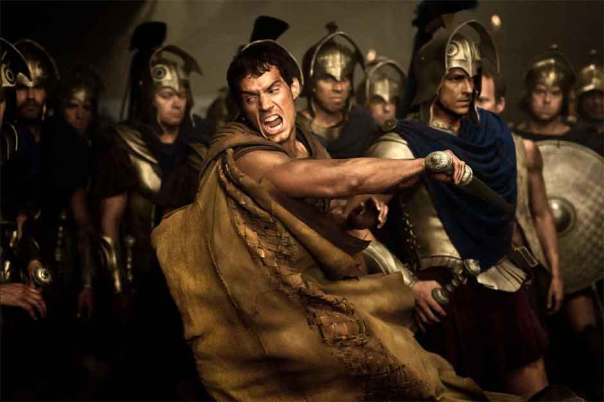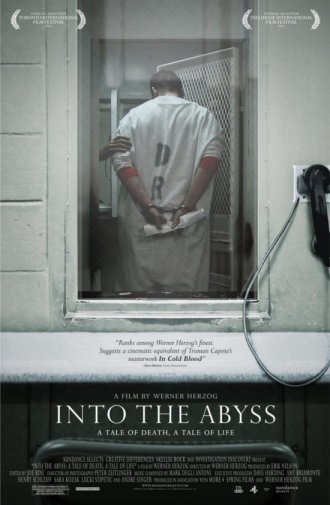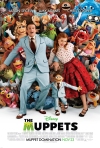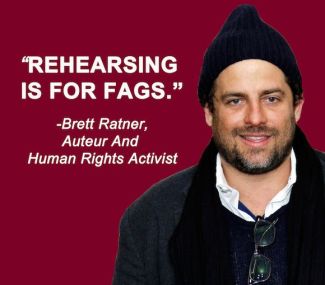Category Archives: pop culture
Cinema Sunday (11/27/11)
Of all my beliefs, my across-the-board opposition to the death penalty is the one I not only have difficulty explaining to others, it’s the one I often have trouble justifying to myself. In his new documentary, Werner Herzog turns his shrewd and perceptive eye toward one particular case in Texas (which, as we all know, is the McDonald’s of capital punishment), that of Michael Perry and Jason Burkett, who were convicted of the murder of three people in 2001: Sandra Stotler, her son Adam, and his friend, Jeremy Richardson. Perry received the death penalty; Burkett, a life sentence. The movie weaves together interviews with Perry (conducted eight days before his execution) and Burkett, as well as family members, police, and citizens of Conroe, Texas. It’s a horrifying, fascinating look at the human cost of capital punishment that is effective precisely for what Herzog chooses not to say.
The movie has been branded (not by Herzog) as a documentary ostensibly about the death penalty, but as I watched it, all I could think is that it’s really a movie about loss. Every last person in the movie has been indelibly and profoundly touched by it. There’s the policeman who walks Herzog through the crime, and the victims’ daughter and sister who acknowledges that the death penalty isn’t very Christian, but, hey, “some people just don’t deserve to live.” There’s the woman at a local bar who was very nearly Perry and Burkett’s victim and the former Texas death house guard who walked away from his job and gave up his pension because he was finally sickened by what he was asked to do on a regular basis. And, yes, there are the murderers themselves, both of whom had the deck stacked against them from a very early age. You see this loss in their eyes – how they can never quite meet the camera’s gaze head-on – and in their voices, which often tremble with emotion, ten years after the fact. Herzog himself has said that Into the Abyss isn’t a movie about capital punishment, and I think he’s right. It’s a movie about the many permutations of loss, and how this one particular case refracts its different facets like light bouncing off a diamond.
One of the most remarkable things about Into the Abyss is how even-handed it is. Herzog is always a powerful presence in his documentaries – paradoxically so, given his unassuming demeanor and soft-spoken, heavily-accented voice – but even though he says early on that he opposes the death penalty, we never get the feeling that he’s pushing an agenda here. The most direct he ever gets with a subject is when he suggests to the Stotlers’ daughter and sister that capital punishment doesn’t seem very Christian. In fact, by showing us grisly crime scene video from 2001, Herzog doesn’t shy away from the brutality of Perry and Burkett’s crime, so, in a way, we’re even less predisposed to feel sympathy for the two men. But, as with all of Herzog’s documentaries, the interviews tell the real story. And the most powerful story they tell – to me, at least – is that capital punishment is staggeringly wrong.
Here’s how it works for me, in the context of the movie. There can be no doubt that in a vast majority of death penalty cases (let’s say 99%) the perpetrator had a clear and distinct choice not to commit the crime. We see that in Perry and Burkett’s case. The murder of Sandra Stotler was the very definition of a senseless crime: she was killed for her car. And the murders of Adam Stotler and Jeremy Richardson were perhaps even more senseless, occurring after Perry and Burkett had disposed of Sandra’s body. These two men very clearly had the choice not to what they did, but they did it anyway. Their guilt, even though both men protest their innocence, isn’t an issue for me, and I don’t think it is for Herzog either. Based on the facts the movie presents us with, I don’t think there’s any question that Perry and Burkett murdered Sandra and Adam Stotler and Jeremy Richardson, and they very definitely had the choice not to commit the murder.
But the question then becomes, do they deserve to die for it? And here’s where the movie helped me clarify my own thinking on the issue. What the proponents of the death penalty fail to realize is that none of these crimes happen in a vacuum. It’s not as though Perry and Burkett were college-bound, straight A students who just one day decided to kill a woman for her car. I would argue that their pasts significantly contributed to the crime they would eventually commit. The most compelling evidence of this comes from Burkett’s father, himself a multiple felon who was in jail serving a thirty-year sentence at the time of his interview. He admits that he was a horrible father who was never around for Jason because he was in and out of jail during his son’s childhood, and he also says that he feels a tremendous amount of guilt for Jason ending up where he did. We don’t learn much about Perry prior to the murders, but we do know he was a homeless 17-year-old at the time he met Burkett. How can we not look at this information as a mitigating factor in their crimes?
I’m not in any way attempting to absolve them of their guilt or trying to make the case that they didn’t deserve punishment. I’m simply trying to make sense of why it’s acceptable to execute two men who very likely had their decision-making facilities diminished by their poor childhoods. How, after learning all we do about Burkett’s childhood, can we in any way believe he was capable of making intelligent – even moral – choices? But maybe that’s the point. Burkett’s father was allowed to come to court, explain his son’s childhood, and plead for Jason’s life. Burkett didn’t receive the death penalty; Perry did. But was Perry, a homeless juvenile, any less damaged? His own father died in prison days before Perry’s interview with Herzog. Are we to believe that because Perry was executed he was capable of making a choice Burkett was not?
It feels to me that when someone’s life is on the line – even the life of a convicted felon – we shouldn’t be haggling over inconsistencies. We shouldn’t allow someone to die because he couldn’t afford the right lawyer. We shouldn’t be willing to accept the statistics that say minorities are more likely to receive the death penalty than white convicts. We shouldn’t buy into the fallacious argument that capital punishment somehow acts as a deterrent to future crime. How is a life sentence without the possibility of parole somehow less satisfying as a punishment than the death penalty? In both cases, the convict’s life has been taken from him, except in the case of the life sentence we’re not condoning state-sanctioned murder.
And, finally, that’s what I I keep coming back to: the death house guard who quit his job rather than assist in the taking of another life. Either murder is right, or it isn’t. This equivocation we’re doing as a society – deciding that some people deserve to live and others don’t – strikes me as both dangerous and at odds with the values this country is supposed to (but often fails to) represent.
I often wonder, though, how my view of capital punishment would change if someone I loved were taken from me. Would I be as steadfast in my belief that it’s wrong, or would I, like Sandra Stotler’s daughter, be consumed with a desire for revenge? The most honest answer I can give is that I hope I never have to find out.
*****
Current listening:
Caithlin de Marrais – Red Coats (2011)
Current reading:
Guillermo del Toro and Chuck Hogan – The Strain (2009)
Last movie seen:
The Muppets (2011; James Bobin, dir.)
Cinema Sunday (11/13/11)
 Before any of my other obsessions – before U2 and R.E.M. and shoegaze and guitars that jingle-jangle, before the films of Woody Allen and the Coen Brothers, before Cormac McCarthy and Kurt Vonnegut and Stephen King – there was Greek mythology. I was eight years old when my parents took me to see the original Clash of the Titans, and it rocked my prepubescent world to its core (not least because it was the first movie in which I saw my first naked boob).
Before any of my other obsessions – before U2 and R.E.M. and shoegaze and guitars that jingle-jangle, before the films of Woody Allen and the Coen Brothers, before Cormac McCarthy and Kurt Vonnegut and Stephen King – there was Greek mythology. I was eight years old when my parents took me to see the original Clash of the Titans, and it rocked my prepubescent world to its core (not least because it was the first movie in which I saw my first naked boob).
Like most young boys, I was way into stories of adventure. The Empire Strikes Back had come out the year before, and it couldn’t have been much before I saw Titans that my mom took me to see Raiders of the Lost Ark (which is, to this day, still my favorite movie of all time). Titans looks antiquated now, with its Ray Harryhausen stop-motion animation, but it was a revelation at the time, a grand adventure that introduced me to the notion of gods and monsters – Zeus and Poseidon and the kraken and Calibos and the Stygian Witches and, of course, snake-haired Medusa. It was a movie where heroes died and victory was uncertain, and I loved every second of it. I loved it so much that I devoured Alan Dean Foster’s novelization of the movie half a dozen times and became a connoisseur of books about the myths themselves. My favorite was D’Aulaires’ Book of Greek Myths, a cleverly-illustrated volume that recounted the myths in an accessible, kid-friendly way. I couldn’t get enough of it.
So, needless to say, it was sort of hard-wired into my DNA that I’d get excited about a movie that purported to tell the story of Theseus (the Greek hero known for, among other things, defeating the minotaur in the labyrinth). I was even more excited to hear that it would be directed by Tarsem Singh. I’m one of maybe five people on the planet who’s a huge fan of his 2000 Jennifer Lopez -starring creepfest The Cell, and I think his 2006 film The Fall is one of the very best movies of the last ten years. Tarsem is known for his striking, sumptuous visuals, and his first two movies make clear that you’re bound to see things in his work that you’ve never seen before.
 When it comes to my review of the movie, it’s probably most efficient to begin with a quote from Roger Ebert. He says Immortals is “the best-looking awful movie you will ever see.” Unfortunately, he’s absolutely right. But, oh man, the beginning of the movie makes some spectacular promises. The titans, defeated by Zeus and the other gods, are trapped in a cube buried deep inside Mount Tartarus. The movie opens with several shots of this cube – it’s small and unassuming from the exterior, but as we see more of it from different angles, we realize that it’s larger inside than it is outside. Cut to the cube’s interior and we see the captured titans, mud-streaked, yoked in rows with iron rods clamped in their teeth, eyes glazed with anger. It’s a queasy, discomfiting opening, and the scene sets a bar for the rest of the movie that’s so high it’s no wonder it can’t clear it.
When it comes to my review of the movie, it’s probably most efficient to begin with a quote from Roger Ebert. He says Immortals is “the best-looking awful movie you will ever see.” Unfortunately, he’s absolutely right. But, oh man, the beginning of the movie makes some spectacular promises. The titans, defeated by Zeus and the other gods, are trapped in a cube buried deep inside Mount Tartarus. The movie opens with several shots of this cube – it’s small and unassuming from the exterior, but as we see more of it from different angles, we realize that it’s larger inside than it is outside. Cut to the cube’s interior and we see the captured titans, mud-streaked, yoked in rows with iron rods clamped in their teeth, eyes glazed with anger. It’s a queasy, discomfiting opening, and the scene sets a bar for the rest of the movie that’s so high it’s no wonder it can’t clear it.
Much of the problem, it has to be said, rests with the screenplay, and it rests with it on two fronts. As written by Charley and Vlas Parlapanides, Immortals is strangely directionless for at least its first half. After that dynamite opening (which is probably due more to Tarsem’s extraordinary vision than anything else) we’re cast into a classic quest and revenge story, as Theseus (Henry Cavill) attempts to recover the famed Epirus Bow before the cruel King Hyperion (played by a horrifically miscast Mickey Rourke) does, and then kill the king as revenge for murdering a spoiler-free member of his family. This is the stuff of high adventure, and I could imagine it as a rocket-powered story borne along in a runalong rush from high point to high point. Instead we get something weirdly listless, as Theseus and Stavros (Stephen Dorff), accompanied by a couple anonymous buff dudes left over from 300 and the Oracle Phaedra (Slumdog Millionaire‘s Freida Pinto), wander around Greece, doing stuff. There’s very little forward momentum; something happens, and then something else happens, and the two things may or may not have anything to do with each other, but who knows? Things don’t really pick up until the halfway point (or what seemed like the halfway point – parts of this movie felt longer than Roots), which is about the point where Theseus faces the Minotaur and the Epirus Bow becomes an active player in the movie.
 The larger problem – one that ran through the length of the movie and not just 55 of its 110 minutes – is that the dialogue was miserable: stilted, wooden, awkward, phony – am I leaving anything out? Look: I’m not asking for fine literature (I started out by lauding the original Clash of the Titans, fer chrissake), but the words at least need to be serviceable. It’s tempting in a case like this to blame the actors, but really – even Daniel Day-Lewis would have trouble selling a line like, “Let’s write history … with blood!” Cavill and Rourke give it the ol’ college try, but when you’re stuck with characters uttering full-on crapola in a movie that doesn’t seem to be going anywhere, not even Tarsem’s impressive arsenal of visual razzle-dazzle can save it.
The larger problem – one that ran through the length of the movie and not just 55 of its 110 minutes – is that the dialogue was miserable: stilted, wooden, awkward, phony – am I leaving anything out? Look: I’m not asking for fine literature (I started out by lauding the original Clash of the Titans, fer chrissake), but the words at least need to be serviceable. It’s tempting in a case like this to blame the actors, but really – even Daniel Day-Lewis would have trouble selling a line like, “Let’s write history … with blood!” Cavill and Rourke give it the ol’ college try, but when you’re stuck with characters uttering full-on crapola in a movie that doesn’t seem to be going anywhere, not even Tarsem’s impressive arsenal of visual razzle-dazzle can save it.
And it’s a real shame, because that razzle-dazzle is really something else. Villages on the edge of a cliff, the Oracle and her handmaidens drinking from a clear pool, the Minotaur in a helmet seemingly made of barbed wire, the Epirus Bow and its golden arrows, Mount Tartarus, the gods in Olympus, a handful of beautifully choreographed battle scenes, and that introductory scene of the titans – Tarsem is an astounding visual stylist, and it’s no hyperbole to say that the entire movie is a feast for the eyes. But it’s also inert and sloppy, a bunch of beautiful images in need of a story that does them justice.
It’s entirely possible to have a movie without a lot of forward momentum that’s also visually dynamic and that features appealing characters speaking clever and engaging dialogue. I’m thinking specifically of David Gordon Green’s All the Real Girls – one of my all-time faves, which also happens to be a stunningly beautiful film without a conventional plot featuring two of my favorite cinematic characters. It works precisely because all the pieces mesh in service of Green’s singular vision. In Immortals, however, Tarsem has to filter his vision through the inferior script, and the result is more a promise of what could have been than what actually is. 38-year-old Monty was a little disappointed; eight-year-old Monty would be crushed.
*****
Current listening:
Boston Spaceships – Let it Beard (2011)
Elemental Ways of Speaking
The longer I live (and here I am at the ripe old age of 38), the more pop culture seems like a giant hamster wheel. Forward motion is illusory. We keep the thing spinning just so we can experience the same old stuff every few months. And I’m not even talking about the Duggars, whom I consider to be as vile an example of human greed and excess as any of the Wall Street bankers.
I’m talking, of course, about Brett Ratner, and the made up conflict surrounding his recent statement that “rehearsing is for fags.”
I’ll get to the nature of that comment in a moment, but first, some perspective. We’ve been here before. The most notorious recent example is Michael Richards, who completely torpedoed his already foundering career with a rant about African-Americans during a standup routine. And just a few months ago – demonstrating that this issue isn’t the province of any particular race – we had Tracy Morgan claiming he’d kill his son if it turned out he was gay. I’d be remiss, too, if I didn’t mention Mel Gibson, who has been accused (with good reason) of being insensitive to gays, Jews, and women, stretching back 15 years or more. Hell, I remember when GLAAD (the Gay & Lesbian Alliance Against Defamation) made him apologize for the anti-gay characters in Braveheart back in ’95 . The point is, the pop culture landscape is littered with this sort of thing. Ratner isn’t the first, and he certainly won’t be the last.
And this is one of the reasons why I’m so annoyed with the way GLAAD has once again handled the situation. Before I dive into arguments like these, I always feel compelled to state my own beliefs, and they are these:
Bigotry – true bigotry – is one of the most idiotic characteristics a person can display. Whether we’re talking about hatred for blacks, gays, women, Jews, Muslims, white dudes, or Eskimos, it’s a sure sign of limited intelligence, self-awareness, sophistication, and evolution. The simple fact is that assholes are everywhere, and attempting to generalize based on skin color, sexual orientation, religion, or any other sort of superficial demographic data is one of the most wrongheaded things a person can do. As for myself, I try to be accepting of everyone, taking them on their merits until they demonstrate behavior that makes them unworthy of respect. This doesn’t make me a hero. It just means I don’t believe in carpet-bombing an entire group of people based on my own fear and ignorance.
However.
I also believe in freedom of speech, and in the certainty that a person can use racist/sexist/homophobic language without actually being a racist/sexist/homophobe. I don’t, for instance, believe that Michael Richards is racist, despite the absolutely vile things he said. If you’ve read about the circumstances surrounding his rant, I think it’s likely that he lashed out in the most hurtful way possible to verbally damage the audience members he’d taken offense to. We can extrapolate from there and wonder about the stability of a man who’d do such a thing, but that’s another issue, based in Richards’ propensity for anger and lack of emotional maturity, not his alleged racism.
Fortunately I think the Brett Ratner case is simpler, which makes the outcry even harder to justify. Ratner is, by most accounts, a pig. Around the same time his “rehearing is for fags” soundbite broke, he went on record as saying he’d “banged” Olivia Munn when she “wasn’t Asian.” So, we’re not exactly dealing with an enlightened gent here (which is well-documented in lots of places, like here), and both of these statements are exactly the kind of juvenile locker room immaturity we should expect from someone of Ratner’s caliber. I’m not saying it’s right that he said it. It’s clearly insensitive, and he’s a grade-A moron for uttering it in front of an open microphone.
But does he deserve to be pilloried in the way that Richards and Gibson and Morgan have been? I don’t think so. The argument I’d like to put forth is that we’ve grown too sensitive as a society, and rather than use this as an opportunity to talk about the casual cruelty inherent in Ratner’s words (which often works its way into the speech of others, especially adolescent boys), GLAAD made him hop on the apology train. So now we get a public statement of dubious sincerity where Ratner disavows his statement, thereby making GLAAD look as thin-skinned and reactionary as it really is. But rather than shaming the speaker, why not focus on the effect such words have on others, especially in light of the “It Gets Better” campaign? Why not try to turn it into a moment where we can unpack the way people toss around the word gay as a pejorative? Nope. Ratner apologizes, and the only thing we’ve gained is that we won’t have to suffer through Eddie Murphy as Oscar host.
The really sad thing is that what GLAAD has done by condemning a juvenile, sophomoric comment (that I truly don’t think had any ill intent behind it) in such an over-the-top way is elevate it to the level of something truly malicious. It’s important to be able to differentiate between the innocuous and the undeniably harmful, and, by treating them as though they’re one and the same, GLAAD muddies the waters. A statement like Ratner’s is taken much more seriously than it should be, which means that the genuinely hurtful statement is, by necessity, diminished.
I’m emphatically not defending what Ratner said. Free speech has consequences, etc., etc., and if you’re going to utter idiotic things in the public eye then you’d better be ready for the fallout. But by the same token I think we’ve reached a point as a society where the fallout has gotten so disproportionate to what was actually said that we’ve managed to infantilize ourselves into a country of thin-skinned, hyper-sensitive children. GLAAD, like it or not, contributes to this every time they publicly shame people like Ratner or Morgan. Treating all insensitive comments as equally offensive just means that we lose the ability to have an intelligent conversation about the language that binds us.
*****
Current listening:
David Lowery – The Palace Guards (2011)
Current reading:
Paul Griffin – The Orange Houses (2009)
Pulled Apart by Horses
 I’m on the record as being 100% opposed to capital punishment. I don’t believe it’s the province of a civilized society, and I fail to see how killing someone – regardless of his or her crime – can be justified by anyone with a modicum of compassion. And of course there’s all kinds of research to demonstrate that the death penalty doesn’t act as a deterrent to further crime the way its proponents claim it does.
I’m on the record as being 100% opposed to capital punishment. I don’t believe it’s the province of a civilized society, and I fail to see how killing someone – regardless of his or her crime – can be justified by anyone with a modicum of compassion. And of course there’s all kinds of research to demonstrate that the death penalty doesn’t act as a deterrent to further crime the way its proponents claim it does.
However.
I might be willing to make an exception for anyone who seriously and unironically attended the vigil for Kim Kardashian’s wedding. With the people of Occupy Wall Street doing truly honorable work in the name of abolishing income inequality, it’s inexcusable for anyone in his or her right mind to attend anything involving this talentless, money-grubbing twit. With all the problems facing us, this is what some people get upset about?
It might not be the end of civilization, but you can see it from here. Simply disgusting.
*****
Current listening:
Athlete – Vehicles & Animals (2003)
Current reading:
Michael Ondaatje – The Collected Works of Billy the Kid (1970)
Last movie seen:
50/50 (2011; Jonathan Levine, dir.)
Dead or in Serious Trouble
I’ve been a reluctant fan of The Today Show for a few years now. I went through a long phase watching CNN’s Headline News with the delectable Robin Meade, then suffered through a shorter phase where I exclusively watched Fox News’ Fox & Friends. Just like I figure one day I need to read the Bible so I’ll know exactly what it is I don’t believe in, I thought it was important to watch Fox News for a while just so I could validate my bitching.
At some point, though, I drifted to NBC and, against my better judgment, got hooked on The Today Show. I liked Matt Lauer’s dry sense of humor and Al Roker’s dorky irreverence. And for whatever reason, I was a huge fan of Meredith Viera, who always struck me as the bawdy, sassy, kinda dirty aunt I never had. It was a kick to watch her slip double entendres into her commentary and openly flirt with Russell Brand. There was always the sense that this trio knew they were doing something that couldn’t be taken seriously, and I appreciated the glib tone that seemed to creep into their stories.
It wasn’t all roses, though. Watching the show meant gritting my teeth as Ann Curry fumbled her way through the headlines. Then there’s the ghastly Summer Concert Series, where every Friday during the summer months I’d mute the TV as Rascal Flatts or Maroon 5 or Ke$ha subjected the lower Manhattan area to the audio equivalent of the Ebola virus. And then of course there were all the stories geared toward the largely female viewing audience. In the roughly three years I’ve watched the program, I’ve learned more about yeast infections and breastfeeding than I ever thought possible.
But I just can’t do it anymore. First there was the show’s Education Nation showcase – a series of episodes focusing on education reform that somehow managed to ignore teachers, parents, and the role that poverty plays in students’ performance in lieu of appearances by bureaucrats, administrators, and businesspeople. It was shockingly obtuse and wrongheaded, and simply parroted all the talking points from the crowd that would like nothing more than to see public education privatized.
Then Viera retired, to be replaced by Curry. This is a decision that has never made sense to me and, as far as I can tell, had to be based on seniority (as the face of the news desk, Curry was clearly next in line for anchor). Where Viera seemed relaxed and genuine with the guests – and was never above poking fun at herself or her co-hosts – Curry is condescending and overly serious. I’m consistently reminded of William Hurt’s character in Broadcast News, who forces himself to cry in an interview so he’ll look like a serious, empathetic journalist. I sincerely can’t bear to watch her work.
But this morning was probably the tipping point. In the space of 45 minutes, I was subjected to the following atrocities:
1) Kris Jenner – Kim Kardashian’s mom – justifying and defending her daughter’s marriage. It was a ridiculous spectacle, and yet more evidence of the celebrity-obsessed nature of our culture. Jenner claimed that any money Kim made from the wedding was reinvested in the ceremony (even if it’s true, it’s disgusting), but the most irritating thing was the umbrage she took at reports that her daughter’s ring cost $2 million. “Poppycock,” Jenner said (and I’m paraphrasing; I know poppycock has three syllables). “It cost less than half that.” In other words, the now-useless ring still cost more than I will make in twenty years. And, newsflash, Mrs. Jenner: if you and your daughter have made your career out of being media whores, you can’t complain when that same media misrepresents things. If you don’t like it, get off the air and get a real job.
2) Bill Cosby, ostensibly interviewed to promote his new book, made some asinine comment about how you’d “have to be dumb” to be an atheist. I don’t care that Cosby’s only relevance in the last twenty years has been in the area of jokes about Jell-O Pudding Pops and ugly sweaters. It’s still a boneheaded comment to make. The last time I checked, the burden of proof is on the people who believe, not on the people who disbelieve. And when you take that comment in conjunction with the sheer number of guests who thank God for saving their kid’s life/sparing their limbs/causing their hair to grow back, it puts the lie to the supposedly ultra-liberal, atheistic nature of the media (more on this in a moment).
3) Susan Boyle sang some stupid song.
4) Arizona governor Jan Brewer, on-air to pimp her new book (in case you can’t tell, The Today Show exists largely as a promotional tool), got to defend her state’s racist immigration policy. This was the most infuriating thing of all. In the span of her interview she got to talk, over and over again and generally unchallenged by Curry, about how the Arizona law is apparently doing God’s work by preventing all the Mexicans from mingling their precious bodily fluids with those of the true, God-fearing Americans. And then, in the same breath, she complained about how the liberal media is twisting her words and making the policy out to be something it isn’t. Jan darling, a word of advice: you can’t fucking do that. You can’t show up on a “liberal media” outlet that you claim to despise, promote your book, laud your policy, and then bitch about the very outlet that’s letting you do this.
I’ve written about this elsewhere, but this is just another example of how the right-wing myth of the liberal media ranks right up there with Santa Claus and the Tooth Fairy. On the #1-ranked morning show, in less than an hour, viewers heard A) one of the most-beloved voices in comedy insult atheists, and B) a governor make the unchallenged claim that her state’s immigration law is just the everyday average sort of law where Mexicans have to prove they’re here legally, no big deal. I didn’t hear anything in that same time period about how the Occupy Wall Street movement is a truly brave populist movement that wants to bring attention to income inequality in this country. And I didn’t hear about how a group of Democratic senators introduced a Constitutional amendment to overturn the Supreme Court’s Citizens United decision. I heard a lot from the other side, though, on a supposedly ultra-liberal media outlet. Funny how that works.
So, Today Show, clean up your act, you’re on notice, etc. There are better things I could do with my time in the morning. I’m allowing you to clutter my brain with unwanted minutiae and fill me up with news about talentless pop culture hacks. Don’t abuse that privilege.
*****
Current listening:
New Model Army – Eight (2000)












